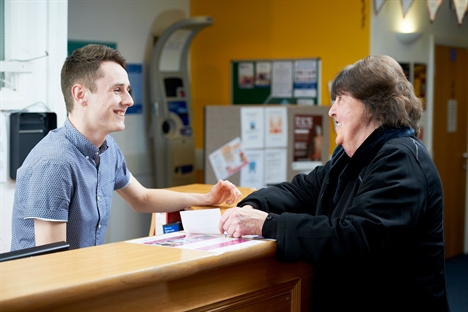01.04.15
The doctor will see you now
Source: NHE March/ April 15
Dr Andy Withers (pictured), clinical chair of Bradford Districts CCG, talks to NHE about why clinical leaders in the local area are funding customer care training for GP receptionists and what he hopes the outcomes will be. David Stevenson reports.
 When NHS Bradford City CCG and NHS Bradford Districts CCG were formed in April 2013 both organisations made a commitment to “improving primary care quality” and “ensuring genuine engagement” for their patients. However, some early work on patient experience in general practice identified one key area where patients were disappointed: the experience of making appointments.
When NHS Bradford City CCG and NHS Bradford Districts CCG were formed in April 2013 both organisations made a commitment to “improving primary care quality” and “ensuring genuine engagement” for their patients. However, some early work on patient experience in general practice identified one key area where patients were disappointed: the experience of making appointments.
This problem was highlighted again when Healthwatch Bradford & District published its ‘Invisible at the desk’ report in early 2014.
Appointment problems
The study received almost 600 comments about GP and dentist services in the area. Although some people spoke positively about their GP practice, the report revealed a widespread frustration at the variation in standards across Bradford. The main problems that people spoke to Healthwatch about were:
- Difficulty in getting GP appointments;
- Problems with the attitude or knowledge of staff; and
- Lack of continuity of care, particularly people not getting to see their own doctor.
Andrew Jones, manager of Healthwatch Bradford & District, said the organisation heard about some good GPs in the district, where systems were working well and where people could see a doctor when they need to.
“However, the views highlighted in our report showed that some groups of people had particularly bad experiences, such as people with mental health needs or from minority ethnic communities,” he added.
“It’s frustrating that good practice doesn’t always seem to be shared across the district and patients still feel that it’s a ‘postcode lottery’.”
The remedy
Following the report, Healthwatch called on the organisations in charge of improving services to bring all practices “up to the standard of the best”.
Responding to the concerns, the CCGs worked with patients and practices to identify the problems people face in getting appointments and suggest how things could be improved.
One way the CCGs are trying to tackle this issue is by funding customer care training for GP receptionists in the area “to help staff make each patient feel valued and at ease”.
Talking to NHE, Dr Andy Withers, clinical chair of Bradford Districts CCG, told us: “After receiving the concerns, our CCGs then took this information into our GP Quality Improvement Group and they came up with the idea of providing some training for staff within practices to enable them to understand things much more from the patients’ point of view and not be the proverbial ‘barrier’.
“We also had a workshop after the initial report from Healthwatch to decide what needed to be included in the training. We had a big event that practices and Healthwatch and other patients were invited to in order to decide what needed to be in the training.”
Following this work, the CCGs drew up a specification to procure the customer training for both organisations.
Striding Edge Consultancy Ltd was picked to deliver the three-hour courses that have been run in 70 GP practices across the city.
More than 800 receptionists are expected to undertake the training, which has cost £33,000 to deliver. So far, more than 500 members of staff have successfully completed the training, which started in November 2014.
The training has covered four main areas:
- Raising awareness of behaviour patterns and using effective communication skills
- Increasing staff empathy and understanding of their patients thereby creating a patient centred ethos and attitude in the practice
- Equipping staff with the tools and techniques to communicate more effectively
- Increasing self-awareness so behaviours, thinking and service can be adapted to different situations
The programme is expected to be complete by the end of April 2015.
“The response from the reception staff has been quite positive,” said Dr Withers. “I think there was a bit of a concern, at the start, that we could be seen to be telling receptionists how to do their jobs – some of whom have been doing their job for many years.“But I think the training, which has been delivered by a commercial organisation rather than in-house, has been pitched in a way that focuses on the patient and the staff have found that quite helpful.”
Sharon Barraclough, business development manager at The Grange Practice in Bradford, added that the benefit of good customer service cannot be underestimated and for many receptionists their favourite part of the job is interaction with patients – however, it’s not always the easiest part.
“Training is vital to what we do ‘on the front line’ and this course recognises the important role every member of the practice team plays in making sure that all patients receive the best quality of care possible,” she said.

Evaluation
The success of the scheme will be followed up through the practice and staff appraisals already in place within the system, NHE was told.
“That is done on an individual basis with practice managers and staff,” said Dr Withers. “But as an organisation we’re going to monitor the success through our ongoing quarterly surveys, which we monitor through our GP quality group.
“Also, Healthwatch, which has taken a keen interest, given its report, will follow the work up through its grassroots exercises separately. So our triangulation for evaluating the programme’s success will be: appraisals, surveys and Healthwatch.”
Dr Akram Khan, clinical chair of Bradford City CCG, added that access to GP services is not just a local issue: “It’s national – and it’s so important because if patients have problems accessing GP services it can have a knock-on effect across the whole of the local NHS system.”
He said that it can result in more people going to A&E or calling the out-of-hours service, when their condition could have been dealt with in the GP surgery or with advice from a pharmacist or self-care.
Broadened primary care offer
NHE was told that some people have asked the CCG why this type of work hasn’t been done before. Dr Withers said: “As we broaden the offer in primary care it is a two-way process. If you pitch up as a patient and say that you would like to see the GP that might not be the best way of addressing your health needs at that time.
“What we really need to do is get receptionists to be the first signpost or navigator to what you might need. However, there is a bit of resistance in terms of how that is done. This is because, in part, patients don’t want to tell receptionists what is wrong with them.
“But I think turning that argument on its head could enable you to get the appropriate care you need. There is clearly this systemic issue that there is not enough GPs and practice nurses to see all the demand. That is why were are looking creatively at what else we can commission around that and then the receptionists can help signpost you to the support you need.”
He added that the proof of the pudding will come in the evaluation. “Whether it has made patients happier in their experience and enabled them to get the care they need or are they [the receptionists] just saying no in a nicer way. I’m hoping that after this work it will be the former.”
Dr Withers also hopes that there could be generalisable lessons for the NHS in what has been a fairly “low-cost investment way of improving patient experience”.
Locality commissioning
NHS England backed 150 CCGs to take on greater GP commissioning responsibilities from 1 April 2015.
In the first announcement, 64 CCGs were approved to take on greater “delegated responsibility” for GP services, including both Bradford CCGs (City & Hackney CCG’s approval is ‘pending changes to some governance arrangements’).
NHS England has been firm in saying that “the scope of primary care co-commissioning in 2015-16 is general practice services only”.
For CCGs with delegated arrangements, this will include contractual GP performance management, budget management and complaints management. However, co-commissioning excludes all functions relating to individual GP performance management (medical performers’ lists for GPs, appraisal and revalidation).
Asked about the news, Dr Withers said: “There are opportunities there. We think the offer that we need from primary care needs to be a local offer and that this will give us the flexibilities to enable that we do ensure that we do get the local offer.
“We’re very optimistic that we will be able to make a difference with those powers. Clearly, though, that will take a year or two to make a real difference on the ground.
“I think we need to ensure we get the balance between how we commission primary care and the provision of it right.
“It also needs to be looked at on the locality basis. The provision might look different to elsewhere, but the outcomes and offer would hopefully be consistent. I think that is really what we’ll be trying to achieve.”
Tell us what you think – have your say below or email [email protected]